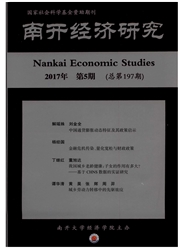

 中文摘要:
中文摘要:
笔者基于中国综合社会调查(CGSS)2008年、2010年的数据,实证分析了全球化背景下英语能力对个体收入的影响。研究结果表明,在不考虑全球化因素时,英语能力对个体年收入的影响并不显著,此时,英语能力对收入的提高,主要是通过受教育程度的提高而体现;进一步按照受教育程度分组之后,英语能力特别是口语能力和阅读能力对于低技能劳动者收入的提高具有一定程度的影响,然而英语能力对高技能劳动者收入的影响仍然不显著;引入地域层面全球化的因素后,在贸易开放和FDI进入的条件下,英语能力的提高对个体收入起到了显著正向的影响,并且FDI进入条件下,学习英语的回报相对更大;引入企业层面全球化的因素后,英语能力的提高对个体收入也起到显著正向的影响。因此,在中国融入全球化的进程中,强调英语能力仍然是必要的,但是英语教学需要因地制宜,因人而异,不能一概而论。
 英文摘要:
英文摘要:
Based on the dataset of Chinese General Social Survey( CGSS) in both 2008 and 2010,this paper empirically analysis the return of learning English,and the effect of globalization in this process. Following conclusions are obtained: firstly,English abilities have insignificant influence on the wage of individual without considering the effect of globalization. The effect of English ability on individual wage mainly works through the promotion of degree of education. Secondly,after grouping the individuals by the degree of education,the English abilities,especially the oral ability and reading ability,have weak significantly influence on the growth of wage of low-skilled workers. However,the English abilities still have insignificant influence on the wage of high-skilled workers. Thirdly,considering the factor of globalization at level of region,we find that trade and FDI have significantly positive influence on the return of learning English,and the effect of FDI is more than the effect of trade. Considering the factor of globalization of firm level,the increased English abilities also have positive effect on the wage of individual. In the process of integrating into the globalization of China,emphasizing English ability is still necessary,but English teaching should be in accordance with local conditions and cannot be generalized.
 同期刊论文项目
同期刊论文项目
 同项目期刊论文
同项目期刊论文
 期刊信息
期刊信息
